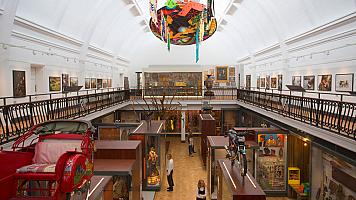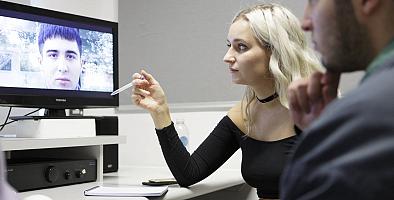MA Social Anthropology
Content navigation menu
Why study MA Social Anthropology at Goldsmiths
Are you interested in a career in anthropology, but haven’t studied the subject before? Have you studied anthropology in the past, but need to consolidate this experience before moving into anthropological research?
- Whatever your disciplinary background, you’ll have the opportunity to build a solid base in social anthropology, its theoretical foundations, methodology and ethnographic diversity.
- You'll learn from leading academics in Anthropology. We've been rated top 10 in the UK for anthropology in the QS World University Rankings by Subject 2025.
- You’ll be able to choose from a variety of optional modules, which means you can tailor the degree to your own theoretical or regional interests.
- You can choose to study a range of topics including gender, sexuality and the body, religion and symbolism, political economy, psychological perspectives in anthropology, the anthropology of rights, and visual anthropology.
- You’ll join a diverse group of students with a range of educational backgrounds and interests, so you’ll be exposed to many different perspectives.
Contact
If you have specific questions about the degree, contact Rebecca Cassidy.
Length
1 year full-time or 2 years part-time
Fees
Home - full-time: £11800
Home - part-time: £5900
International - full-time: £23000
School
Subject
What you'll study
You'll take two compulsory modules that will familiarise you with the most important theoretical positions within anthropology and will introduce you to key methodological questions.
You'll also complete a dissertation.
| Module title | Credits |
|---|---|
| Anthropological Theory | 30 credits |
| Anthropological Research Methods | 30 credits |
| Dissertation | 60 credits |
How you'll be assessed
Dissertation; reports; take-home papers. Optional modules may require a presentation or production of visual material.
Watch videos about your course
What our students say



Careers
This programme is ideal if you're thinking of pursuing a career in the media, or in research, teaching, policy and many other fields.
Recent graduates have been employed by Amnesty International, Médecins Sans Frontières, and the Royal Anthropological Institute.
The Masters also provides an excellent grounding for students interested in pursuing research in social anthropology – several graduates have gone on to complete research degrees at Goldsmiths.
Skills
You'll develop high-level theoretical knowledge throughout the degree, and the skills you'll hone will include:
- Skills in critical and creative analysis
- Planning skills
- The development of original ideas and independent research
- Social science research skills
- Written and verbal communication skills
Entry requirements
You should normally have (or expect to be awarded) an undergraduate degree of at least second class standard in a relevant/related subject.
You might also be considered for some programmes if you aren’t a graduate or your degree is in an unrelated field, but have relevant experience and can show that you have the ability to work at postgraduate level.
International qualifications
We accept a wide range of international qualifications. Find out more about the qualifications we accept from around the world.
If English isn’t your first language, you will need an IELTS score (or equivalent English language qualification) of 6.5 with a 6.5 in writing and no element lower than 6.0 to study this programme. If you need assistance with your English language, we offer a range of courses that can help prepare you for postgraduate study.
Fees and funding
Annual tuition fees
These are the PG fees for students starting their programme in the 2025/2026 academic year.
- Home - full-time: £11800
- Home - part-time: £5900
- International - full-time: £23000
If your fees are not listed here, please check our postgraduate fees guidance or contact the Fees Office, who can also advise you about how to pay your fees.
It’s not currently possible for international students to study part-time under a student visa. If you think you might be eligible to study part-time while being on another visa type, please contact our Admissions Team for more information.
If you are looking to pay your fees please see our guide to making a payment.
Funding opportunities
Explore the Goldsmiths scholarships finder to find out what funding you may be eligible for.
If you are a UK student you may be eligible for a postgraduate loan.
Meanwhile our Careers Service can also offer advice on finding work during your studies.
Paying your fees
Find out about paying your tuition fees.
Additional costs
In addition to your tuition fees, you'll be responsible for any additional costs associated with your course, such as buying stationery and paying for photocopying. You can find out more about what you need to budget for on our study costs page.
There may also be specific additional costs associated with your programme. This can include things like paying for field trips or specialist materials for your assignments. Please check the programme specification for more information.
How to apply
You apply directly to Goldsmiths using our online application system.
To complete your application, you will need to have:
- Details of your academic qualifications
- The email address of your referee who we can request a reference from, or alternatively a copy of your academic reference
- Copies of your educational transcripts or certificates
- A personal statement
You'll be able to save your progress at any point and return to your application by logging in using your username/email and password.
When to apply
We accept applications from October for students wanting to start the following September.
We encourage you to complete your application as early as possible, even if you haven't finished your current programme of study. It's very common to be offered a place that is conditional on you achieving a particular qualification.
Late applications will only be considered if there are spaces available.
If you're applying for funding, you may be subject to an earlier application deadline.
Selection process
Admission to many programmes is by interview, unless you live outside the UK. Occasionally, we'll make candidates an offer of a place on the basis of their application and qualifications alone.
Further guidance
Read our guide to applying for a postgraduate degree at Goldsmiths.





